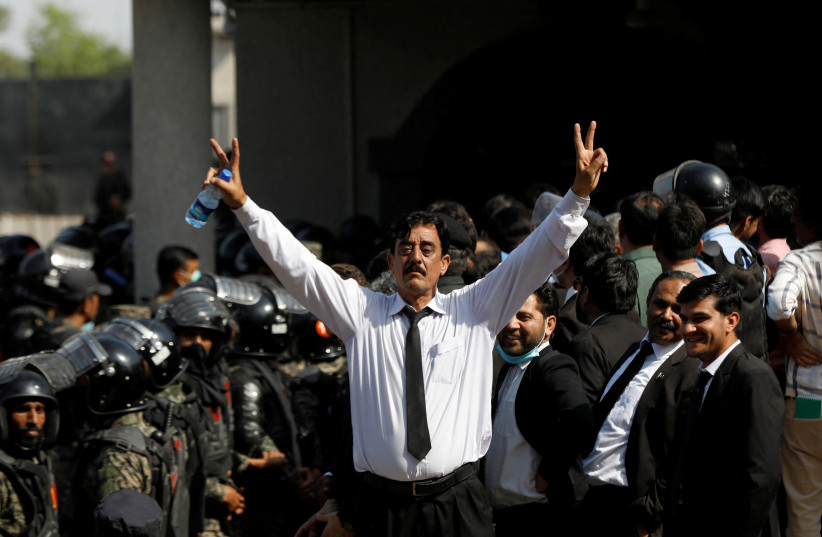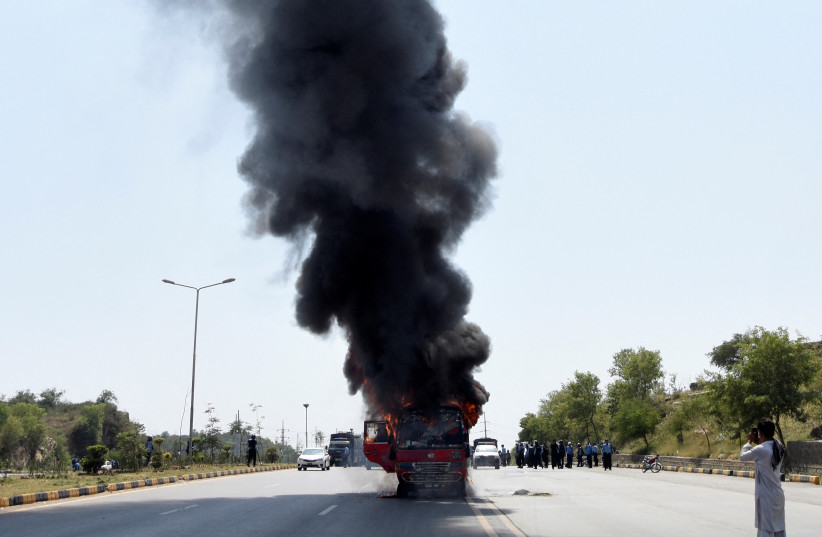[Islamabad] Pakistan’s ousted prime minister, Imran Khan, was released on a two-week interim bail by a special bench of the Islamabad High Court on Friday. The court also instructed the authorities not to arrest Khan in any case filed against him anywhere in the country until Monday, May 15.
For more stories from The Media Line go to themedialine.org
Khan served as prime minister from the Pakistan Tehreek-e-Insaf (PTI) party from 2018 to 2022, when he was ousted in a parliamentary no-confidence vote. He has since led a popular campaign against the current coalition government. Khan was arrested last Tuesday on charges of corruption. He insists that these charges, like the numerous charges made against him, are baseless and politically motivated.
Many of Khan’s supporters were waiting for him at the courthouse when he arrived on Friday, as were hundreds of members of the security forces. The adjacent roads were kept closed.
The special bench that released Khan on bail was made up of Justices Miangul Hassan Aurangzeb and Saman Rafat Imtiaz. After being released, Khan departed the court premises and traveled to his home in Lahore, Punjab’s capital.
Why did Pakistan arrest Imran Khan and then release him?
Khan was arrested last Tuesday while appearing in court following instructions from the country’s anti-corruption agency, the National Accountability Bureau. His arrest came a day after the country’s military warned him against making “baseless allegations.” Khan had recently accused a senior military official of plotting to kill him.

Friday’s bail order follows the Supreme Court declaration on Thursday that Khan’s arrest had been “unlawful.” The court ordered the authorities to present him before the Islamabad High Court on Friday.
Chief Justice of Pakistan Umar Ata Bandial said, “Khan's arrest inside the court premises was illegal.”
“Khan's arrest inside the court premises was illegal.”
Umar Ata Bandial
After being arrested, Khan remained under judicial supervision at the Police Headquarters guest house in Islamabad, as the Supreme Court had ordered.
Faisal Chaudhry, a senior member of Khan’s legal team, told The Media Line that the legal team is working “to ensure that there is peace in the country and that all matters are conducted according to the law.”
Khan’s arrest on Tuesday sparked massive public unrest. Angry crowds stormed public and private buildings, including army installations, and set several of them on fire. Sources report that more than 2,200 people have been arrested, more than 10 have been killed, and dozens have been injured in clashes with police.
In response to the protests, the government called on the troops to maintain law and order. The government also suspended mobile data services and blocked social media platforms. Schools and government offices were also closed.
A spokesperson for the Punjab Police said in a statement on Friday that more than 150 police officers had been injured in the protests.
Meanwhile, Pakistan's coalition government expressed disappointment at Friday's bail decision, accusing the court of favoring Khan. The government announced plans to stage a protest in front of the Supreme Court on Monday.
“The judiciary has become an iron shield for Imran Khan.”
Shehbaz Sharif
“The judiciary has become an iron shield for Imran Khan,” Prime Minister Shehbaz Sharif said during a cabinet meeting.
Khan has denied allegations that members of his PTI party were involved in anti-government activities during the recent protests.
“There should be an independent investigation into attacks and vandalism on government property, but this investigation should be conducted only under the chief justice of the Supreme Court.”
Imran Khan
“There should be an independent investigation into attacks and vandalism on government property, but this investigation should be conducted only under the chief justice of the Supreme Court,” Khan said on Saturday on the party’s official social media pages.
He accused the government of trying to “create unrest and chaos in the county” and claimed that peacefully protesting PTI members had been shot.
Chief of Army Staff Gen. Asum Munir vowed to put an end to the protests in an address to senior army officers in Peshawar on Saturday.
“The armed forces will not tolerate any further attempt of violating the sanctity and security of its installations,” Munir said.
Retired Maj.-Gen. Javed Aslam Tahir, senior vice president of the Pakistan Ex-Servicemen Society, told The Media Line that the arrest was part of the government’s attempt to suppress Khan’s political influence.
Tahir noted that the massive public outcry against Khan’s arrest has led the government to reevaluate its plans. “Now any move by the government without serious homework will be detrimental to their overall popularity, which has already severely plummeted,” he said.
Tahir also said that the Supreme Court, rather than the coalition government, needs to address the situation.
“The proactive role of the establishment in the political quagmire will be reduced significantly, or else the deepening instability, chaos, and destabilization cannot be ruled out. The only solution to all these crises is free and fair general elections should be held as soon as possible,” he said.
Adeeb Ul Zaman Safvi, a Karachi-based retired Navy captain and prominent political and security analyst, also said that immediately holding general elections was the only solution to the current crisis.

Safvi said that the political quagmire is just one of the crises currently facing Pakistan.
“The economy has been destroyed as the country stands on the verge of defaulting on repayment of IMF [International Monetary Fund] loans. Inflation is running close to 45%, as the price hike of daily-use edible commodities puts them out of reach of the common man,” he told The Media Line.
Jazib Mumtaz, a Karachi-based research economist, said that the political instability will cause the economic situation to further deteriorate.
“The chaos caused by Khan’s arrest, followed by his release, has further aggravated the already fragile economic situation,” Mumtaz told The Media Line. “Political wrangling among institutions and politicians has caused a delay in IMF’s staff-level agreement and external funding from friendly countries. If the situation persists, it is highly likely that we may reach the point of economic meltdown.”
Islamabad-based political analyst Azeem Khalid told The Media Line that he expects the situation to become even more chaotic in the coming days.
“The coalition regime understands that they cannot afford to [hold] elections as Imran Khan’s victory is evident, so the regime allies will try their level best to create a chaotic situation in the country, just to delay the coming general elections,” he said.
Alongside the economic and political crises, Pakistan is also grappling with a constitutional standoff after Prime Minister Sharif’s government rejected a Supreme Court order to hold local elections in Punjab by mid-May. Noncompliance could result in court action against the government.
